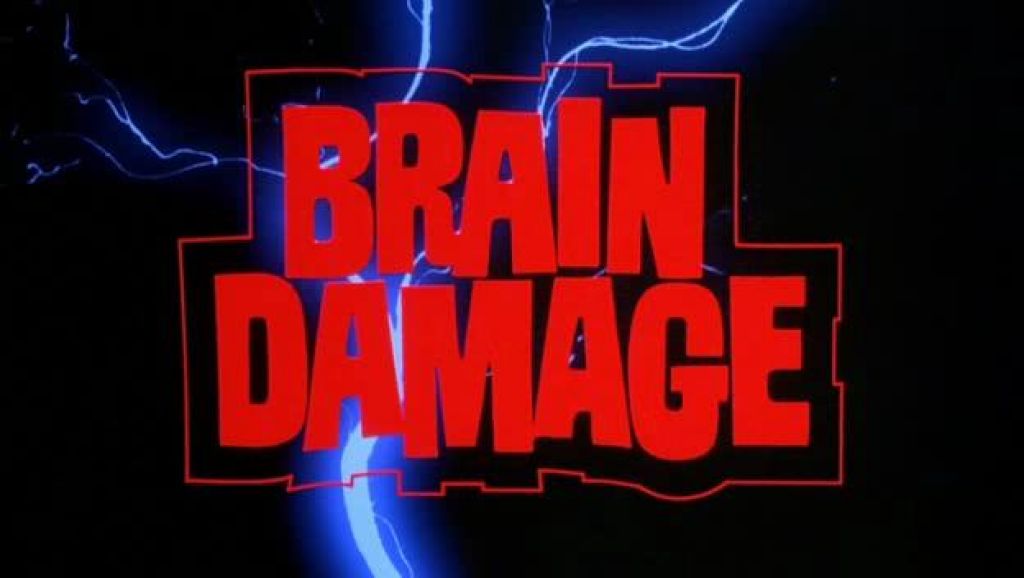
Podcast (horrorbusiness): Play in new window | Download
Subscribe: RSS

Episode VII: Say No To Drugs But Say Yes To Horror Business
Greetings, children of the night, and welcome back to another timber shivering episode of Horror Business, the podcast that came here to chew bubble gum and kick ass and it’s not only out of bubblegum but is hosted by two flabby weirdos who couldn’t fight their way out of a paper bag. Thanks always for checking us out, because ultimately we do this for you.
This episode deals with the rather touchy subject of addiction, be it to drugs, alcohol, an abusive relationship, or whatever weird blue stuff Alymer secretes in our first film Brain Damage. All joking aside, addiction is undoubtedly one of the more horrific aspects of society that is often used merely as a vehicle in horror films instead of actually being examined and commented upon as an actual phenomenon.

The episode starts out with a brief discussion on the life and work of H.P. Lovecraft, who’s death anniversary fell on March 15th when this episode was recorded. His impact on the world of horror and weird fiction is undeniable, but unfortunately his rather unsavory views on race were equally undeniable. We briefly discuss the concept of separating the work from the creator, and ponder as to whether or not it was even possible to do so with Lovecraft, and ultimately decide that while the impact of Lovecraft’s work cannot and should not be denied, his legacy should contain something of an asterisk after it and his personal views should not be brushed under the rug. The recent film The Witch is also discussed, and how the difference between “terror” and “horror” have impacted the way modern horror audiences view and digest horror films.
The first film of the episode, as previously mentioned, is Frank Henenlotter’s 1988 film Brain Damage. The obvious parallels between the relationship between the parasite Alymer and the protagonist Brian and that of an addict and drugs is discussed. Similarly, the abusive nature of that relationship is brought up in how it resembles an actual abusive relationship between two individuals even without drugs being involved. Henenlotter’s intent in making the film is a focal point of the discussion: did he make it in an attempt to bring attention to the plight of an addict, or was he merely using the subject of addiction as a vehicle to further a plot? Was it a social commentary upon the public perception of addiction at the time (the tail of end of the Reagan Era and the subsequent ‘War On Drugs’)? The seesawing tone of the film is discussed, in that the film goes from humorous and silly to extremely dark and grim: despite being about a brain eating parasite driving a character to murder by keeping him addicted to its own secretions, there is an underlying flavor of silliness to most of the movie with the exception of a few parts. Henenlotter’s other work, primarily Basket Case, is brought up in an attempt to ascertain a more serious message to the film. A minor point is made on the aesthetics of the film; it takes place in late 80s New York City, just prior to the ‘Disneyification’ of the city.


The second film of the episode is Guillermo del Toro’s 1993 vampire film Cronos. The genre of the film is discussed; is it a fantasy movie? A straight up vampire film? A tragic horror film? Again, as with Brain Damage, the parallels to real world addiction is discussed, although unlike the first film Cronos takes a far more delicate and sympathetic stance on addiction in that it largely treats addiction as an actual phenomenon and disease rather than something that is used merely to further a plot. The possibility of recovery that is symbolized by the conclusion of the film is examined, and the weirdly hopeful tone it gives the film as opposed to the bleak and nihilistic tone of Brain Damage. The motives for drug use are discussed in how they are presented in the film. Attention is given to del Toro’s stylistic choices, given that Cronos was his first film and set the standard for what would become many del Toro trademarks: an obsession with insects, a tragic monster as a main character, a fascination with the mechanical and it’s relation to the organic, and an obsession with cheating death.


As always thanks to everyone and anyone who checked this episode out. We love you forever for listening. Any questions, comments, suggestions for movies and guests, or if you yourself want to join us for a movie viewing or even an episode, can be sent to [email protected]. Thanks again to Justin Miller and Doug Tilley for their technical contributions, and also thanks to Josh “Tinky Winky” Alvarez for the dope theme song. Follow us on Twitter at @thehorrorbiz666, like us on Facebook, and remember to rate, review, and subscribe to us on ITunes! Thanks!






1 Comment